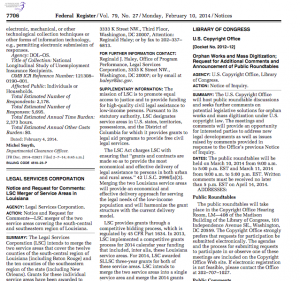ORPHAN WORKS is red hot again. After a number of failed legislative attempts and a couple of high profile court cases, its back to the drawing board, albeit a better defined drawing board. On the one hand, most everyone agrees that for true orphans, it would be great for us all to be able to digitize, copy, adapt, distribute and otherwise use them. On the other hand, how do we know it’s a true orphan? What if there is an “orphan” owner?
The Copyright Office just held two days of public roundtables on Orphan Works (See twitter #orphanworks for some flavor of the sessions). The Copyright Office has now opened up the floodgates for public comment from those of us who were not in D.C.
Update from last go round: the Copyright Office, in the Federal Register notice, notes that the Authors Guild, Inc. v. Google Inc court said it’s up to Congress, not the courts, to resolve orphan works issues. The court later ruled that the Google Books project is fair use, stating that “Google Books provides significant public benefits.” Yet orphan works are not really addressed and it’s not known how broadly that opinion justifies other mass digitization projects. The HathiTrust decision found a related mass digitization project to be fair use. Again, orphans are not really addressed, and in fact The Hathi Trust suspended its orphan works project right after the complaint was filed. [Note: Justia makes the full dockets of these cases available with RSS feeds for those of you who want to be notified of new filings as they come in.]
So how do resolve our desire to use the orphan works? Many library digitization projects are replete with rich content in completely untraceable photos, letters, scrapbooks, etc. Do we need legislation to help these and other projects go forward? If so, what shape should legislation take?
Public comment is sought for the following topics. More detail on the contours of each of these topics can be found in the Federal Register notice.
The U.S. Copyright Office held public roundtables on orphan works the last two days in D.C. Now is the time for those who couldn’t attend to weigh in during the open public comment period. The deadline is April 14th.
Public comments sought on:
(1) The need for legislation in light of recent legal and technological developments
(2) defining a good faith “reasonably diligent search” standard
(3) the role of private and public registries
(4) the types of works subject to any orphan works legislation, including issues related specifically to photographs
(5) the types of users and uses subject to any orphan works legislation.
Additionally on:
(1) Remedies and procedures regarding orphan works
(2) mass digitization, generally
(3) extended collective licensing and mass digitization
(4) the structure and mechanics of a possible extended collective licensing system in the United States.

